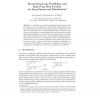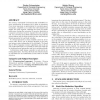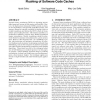177 search results - page 13 / 36 » The garbage collection advantage: improving program locality |
LCPC
1993
Springer
14 years 20 days ago
1993
Springer
Abstract. Loop fusion is a program transformation that merges multiple loops into one. It is e ective for reducing the synchronization overhead of parallel loops and for improving ...
CASES
2007
ACM
14 years 17 days ago
2007
ACM
For memory constrained environments like embedded systems, optimization for program size is often as important, if not more important, as optimization for execution speed. Commonl...
CASES
2010
ACM
13 years 6 months ago
2010
ACM
Dynamic binary translators (DBTs) are becoming increasingly important because of their power and flexibility. However, the high memory demands of DBTs present an obstacle for all ...
POPL
2009
ACM
14 years 3 months ago
2009
ACM
With the emergence of commodity multicore architectures, exploiting tightly-coupled parallelism has become increasingly important. Functional programming languages, such as Haskel...
CF
2006
ACM
13 years 10 months ago
2006
ACM
The growing speed gap between memory and processor makes an efficient use of the cache ever more important to reach high performance. One of the most important ways to improve cac...



